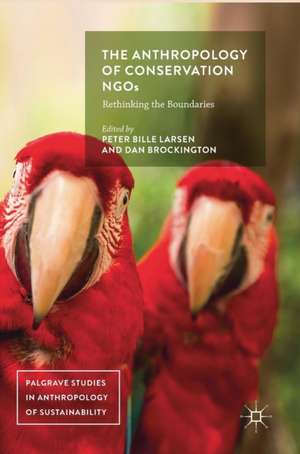The Anthropology of Conservation NGOs: Rethinking the Boundaries: Palgrave Studies in Anthropology of Sustainability
Editat de Peter Bille Larsen, Dan Brockingtonen Limba Engleză Hardback – oct 2017
| Toate formatele și edițiile | Preț | Express |
|---|---|---|
| Paperback (1) | 234.65 lei 6-8 săpt. | |
| Springer International Publishing – 22 iun 2018 | 234.65 lei 6-8 săpt. | |
| Hardback (1) | 784.61 lei 6-8 săpt. | |
| Springer International Publishing – oct 2017 | 784.61 lei 6-8 săpt. |
Preț: 784.61 lei
Preț vechi: 956.84 lei
-18% Nou
Puncte Express: 1177
Preț estimativ în valută:
150.14€ • 157.47$ • 124.98£
150.14€ • 157.47$ • 124.98£
Carte tipărită la comandă
Livrare economică 01-15 aprilie
Preluare comenzi: 021 569.72.76
Specificații
ISBN-13: 9783319605784
ISBN-10: 331960578X
Pagini: 297
Ilustrații: XV, 289 p. 4 illus., 2 illus. in color.
Dimensiuni: 148 x 210 mm
Greutate: 0.52 kg
Ediția:1st ed. 2018
Editura: Springer International Publishing
Colecția Palgrave Macmillan
Seria Palgrave Studies in Anthropology of Sustainability
Locul publicării:Cham, Switzerland
ISBN-10: 331960578X
Pagini: 297
Ilustrații: XV, 289 p. 4 illus., 2 illus. in color.
Dimensiuni: 148 x 210 mm
Greutate: 0.52 kg
Ediția:1st ed. 2018
Editura: Springer International Publishing
Colecția Palgrave Macmillan
Seria Palgrave Studies in Anthropology of Sustainability
Locul publicării:Cham, Switzerland
Cuprins
1. Introduction: Rethinking the Boundaries of Conservation NGOs.- 2. "The Good, the Bad, the Ugly, and the Dirty Harrys of Conservation": Revisiting the Anthropology of Conservation NGOs.- 3. Anthropology of Conservation NGOs: Learning from a Sectoral Approach to the Study of NGOs.- 4. Business, Biodiversity and New "Fields" of Conservation: The World Conservation Congress and the Renegotiation of Organisational Order.- 5. The Strategies and Effectiveness of Conservation NGOs in the Global Voluntary Standards: The Case of the Roundtable on Sustainable Palm-oil.- 6. Investigating Consistency of a Pro-Market Perspective Amongst Conservationists.- 7. Conservation Jujutsu, or How Conservation NGOs Use Market Forces to Save Nature from Markets in Southern Chile.- 8. Strength and Limitations of Conservation NGOs in Meeting Local Needs: The Case of REDD+ in Nigeria.- 9. Misreading the Conservation Landscape.
Recenzii
“The intent of the book to open up new and productive spaces of collaboration should be welcomed. It serves as a reminder to conservation NGO staff of the need to find space for reflection in practice, which may well be possible at an individual level but is challenging for an institution.” (Rob Small, Oryx, Vol. 53 (4), October, 2019)
“This book is a prime example of the high-quality scholarly work that is being produced within the framework of this new generation of critical environmental conservation studies. ... This book is to be commended for its success in addressing and transposing some of the limitations that accompanied earlier studies. … this book will be of great use to a variety of readers who seek to deepen their understanding of contemporaryenvironmental conservation.” (Katja Neves, Conservation & Society, Vol. 17 (4), 2019)
Notă biografică
Peter Bille Larsen is an anthropologist with two decades of experience in global conservation research and practice. He teaches sustainable development, environmental anthropology, and international governance at the University of Lucerne, Switzerland.
Dan Brockington directs the Sheffield Institute of International Development at the University of Sheffield, UK. His research covers conservation, agricultural change, and celebrity, entailing fieldwork in remote parts of East Africa and offices in large cities.
Textul de pe ultima copertă
This book explores how NGOs have been influential in shaping global biodiversity, conservation policy, and practice. It encapsulates a growing body of literature that has questioned the mandates, roles, and effectiveness of these organizations–and the critique of these critics. This volume seeks to nurture an open conversation about contemporary NGO practices through analysis and engagement.
Caracteristici
Offers an alternative vantage point to the growing body of anthropological literature surrounding NGOs in their many forms and capacities Sheds light on the multiplicity of actors involved in conservation efforts Clarifies the discourse surrounding the role of NGOs in a wider global setting







